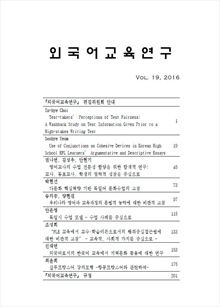간행물
외국어교육연구 Foreign Language Education Research

- 발행기관 서울대학교 외국어교육연구소
- 자료유형 학술지
- 간기 반년간
- ISSN 1229-5892 (Print)
- 수록기간 1998 ~ 2018
- 주제분류 사회과학 > 교육학 사회과학 분류의 다른 간행물
- 십진분류KDC 705DDC 405
권호리스트/논문검색
제11호 (2008년 12월) 8건
1.
2008.12
구독 인증기관 무료, 개인회원 유료
The paper outlines a model for an English for Academic Purposes [EAP] programme designed to enhance the micro and macro study skills of students in the Arts from non-Western educational backgrounds. This EAP model draws on Jurgen Habermas‟s (1995; 1988) theory of communicative rationality to argue that the contemporary culture of inquiry in Arts‟ subjects reflects the communicative rationality that – according to Habermas -- has constituted the modern, Occidental lifeworld. The emergence of communicative rationality Habermas suggests is socio-culturally and historically specific. In other words, it has largely been absent from the socio-cultural contexts of many non-local entrants into Western universities. Yet, effective and successful participation in the Western academic discourse community, as well as everyday or non-scientific discourse communities, at least partly depends on a non-local student‟s awareness of the historical impacts generated by the developmental trajectory of communicative rationality. Successful participation in the Western academic context also depends on a non-local student‟s growing mastery over the methodologies, again generated by communicative rationality, that underpin this culture of inquiry. The EAP model proposes a practice based on a history of the ideas that form the bases of the Western academic tradition. It suggests that the macro (critical thinking, formal register) and micro-level (word choice, sentence construction) skills expected of students in Arts‟ subjects in Western universities are shaped by broader disciplinary and historical features. The pedagogical framing of this EAP model reflects the principles of situated learning theory (Lave & Wenger, 1990; McLellan, 1995) and addresses the recent research of Duff (2007), Morita (2004) and Zamel and Spack (1998).
5,200원
2.
2008.12
구독 인증기관 무료, 개인회원 유료
Information Communication Technology (ICT) diffuses to a mixed reception among academics, partly because the scope for pre-adoption experimentation needed for devising new practice is being eroded by the centralized nature of infrastructural controls that accompany initial ICT implementation. Corporate managers now leading Universities are coming to regard ICT as the key to implementing the transition from the modern „mass university” to the future “virtual university“ ( see table 3.1 in Delaney 2002). Clearly, face-to-face teaching is soon to be widely regarded as only one of the options in course-unit content delivery, especially if course-unit pre-requisites are to be relaxed in the interests of widening appeal and class sizes without generalizing content so much as to dilute quality, not to mention relevance. It is argued here that, in this context, online delivery should be in hypertext including links to relevant web sites, and that if the university cannot support the necessary net-ware, the hypertext can be distributed on CD with supporting documents, with teacher-student interaction served through a university web site and/or email system. Introduction
4,300원
3.
2008.12
구독 인증기관 무료, 개인회원 유료
4,000원
4.
2008.12
구독 인증기관 무료, 개인회원 유료
4,600원
5.
2008.12
구독 인증기관 무료, 개인회원 유료
4,900원
6.
2008.12
구독 인증기관 무료, 개인회원 유료
The is the commonest word in English. This word is also known as one of the most difficult grammatical items for Korean learners of English as a foreign language. This paper focuses on the non-generic use of the English definite article, and examines the grammatical descriptions of the article in Advanced English Grammar and English Grammar in Use. It reveals that some of the important usages of the definite article are not included in 'the grammar books', and observes, following Park and Song (2001), that these unlisted usages cause much difficulty for Korean learners to improve accuracy in the article use. Underscoring the organic view of language, the paper proposes that a comprehensive and systematic understanding of 'grammar' is prerequisite for optimum efficiency in teaching the English definite article to Korean EFL learners.
5,200원
7.
2008.12
구독 인증기관 무료, 개인회원 유료
Since the introduction of the 6th National Curriculum, English pronunciation teaching in Korea has geared toward fluency, less focusing on accuracy. Since then the two technical terms, accuracy and fluency, have been widely used in the EFL literature in Korea, but in a rather confusing way. This paper is an endeavor to clarify these two concepts in terms of the viewpoints of Phonetics and English Education. From the phonetic standpoint, I argued that accuracy is more closely related to 'clear speech,' whereas fluency is applicable to either 'clear speech' or 'casual speech'. I also suggested two methods for the evaluation of English speaking fluency: one is the evaluation of weak form pronunciation: the other, sentence stresses. From a viewpoint of English Education, I reviewed some relevant literature and found that (1) accuracy and fluency are related to language usage and language use, respectively; (2) accuracy and fluency have been used as terms applicable to all four language skills in language learning, rather than speaking skill only: (3) a definition of fluency needs to be modified for its flexible use in ESL/EFL classroom setting; (4) a number of recent textbooks on pronunciation teaching include lots of useful fluency enhancing practices. As a conclusion, I summed up afore-mentioned discussions and presented some suggestions for the National Curriculum in the future.
4,500원
8.
2008.12
구독 인증기관 무료, 개인회원 유료
This paper explores how the subject prominent features in a given language are correlated with the grammaticalization of syntactic rules within the Germanic typology. Drawing relevant data from German and English this research focuses on the grammatical constructions such as morphologically case-marked constructions, passive constructions, clause-union constructions and raising constructions. In this functional typological study, it is demonstrated that the subject-centered English type constructions can be interpreted as extreme cases even within the Germanic typology. Furthermore, it is claimed that prominence typology does not have to be viewed as a discrete dichotomy and that it is rather a gradable concept.
4,300원

